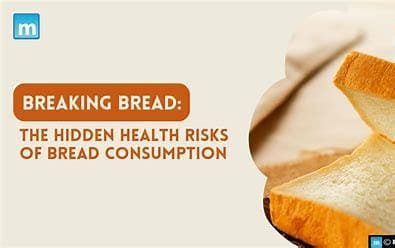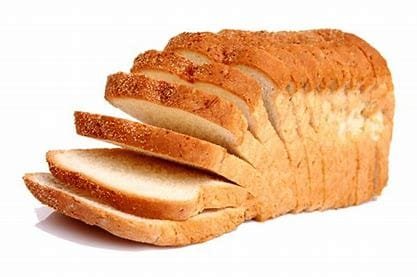
Bread has been part of everyone’s diet for many years, and it provides people with a cheap and versatile source of food worldwide. However, daily bread consumption comes with its own set of drawbacks, especially when viewed against the backdrop of modern health issues and the nutrition profile of most types of bread sold today. While bread may be included in a well-balanced diet, its daily consumption leads to various health problems. The article presents the possible disadvantages of consuming bread every day and why moderation is the best course of action.
1. More carbs and less nutrients.
Most kinds of bread are basically refined carbohydrates, which are quickly digested in the body, causing the blood sugar to shoot up high in the blood. White bread is made from refined flour, which has removed the fiber, vitamins, and minerals, making it very nutrient-poor compared to whole grains. The lack of fiber in most kinds of bread means quicker digestion and a faster return of hunger, which leads to eating more throughout the day.
This will lead to individuals gaining more weight due to the huge amounts of refined carbs taken in by their body, while at the same time the blood sugar level becomes even more impossible to control. On top of this, a significant proportion of nutrients such as iron, B vitamins, and magnesium found in whole grains gets minimized or is totally extracted during refining processes, with potential effects for nutritional imbalances.
2. Effects on Glycemic Index
GI is the rate at which foods raise blood sugar. White bread and most packaged bread options have a high GI because they cause a rapid rise in blood glucose. This upsurge may lead to a crash, manifesting as individuals become hungry, tired, and irritable again. Long-term intake of high-GI foods increases the risk of insulin resistance, a condition precursor to type 2 diabetes.
Even the options that are whole-grain or multigrain tend to have a relatively lower glycemic index. These, too, can greatly influence blood sugar if consumed in large amounts. For patients who have diabetes or suffer from insulin resistance, daily intake of bread could make their blood sugar unmanageable, leading to further complications.
3. Gluten sensitivity and digestive issues
Gluten is the protein that makes most bread in wheat, barley, and rye. For patients who have gluten intolerance or celiac diseases, taking bread would mean extreme discomfort with digestive problems such as bloating and gas and diarrhea and, eventually, malnutrition. Even others without this disease can cause discomfort if one suffers from having a gluten sensitivity, and that’s rapidly increasing for people worldwide.
Moreover, bread, primarily white and processed, contains several additives, preservatives, and other chemical agents introduced to increase shelf life and, to some extent, maintain a good texture. In addition, these may compound the problem of digestive disturbances and, in some scenarios, promote inflammation, which then complicates matters for an individual with a sensitive stomach or those with gastrointestinal ailments, such as IBS.
4. Risk for Weight Gain and Higher Percentage of Body Fat
It is possible to gain weight by consuming bread every day, especially if you are not balancing that with other healthy foods. Bread is a calorie-rich food and lacks the protein, fiber, and essential nutrients that keep you full. Without these components, you may end up consuming more portions or extra snacks just to fill the hunger. Long-term, increased calorie intake tends to induce weight gain and increase body fat, especially in cases where it occurs with combinations of such calorie-dense breads with butter or cheese or high sugar-containing spreads.
Besides, excessive consumption of refined carbs causes the accumulation of visceral fat, which is linked to metabolic diseases, including heart disease and type 2 diabetes. For those who aim to retain or lose some weight, then avoiding bread or switching to whole-grain, fiber-rich bread can be the ideal step.
5. Adds Preservatives and Chemicals

Most commercial bread products are overprocessed and contain many additives, preservatives, and emulsifiers. Such additives can be bad for health, although these additives are generally safe to consume in small amounts. Long-term consumption may expose the body to synthetic compounds, which it was not made to process. Some ingredients, such as high fructose corn syrup, have a correlation with obesity and other metabolic diseases when consumed excessively.
Additives used in bread might interfere with gut microbiota—a complex mix of bacteria, viruses, and fungi. It helps to digest the food you consume, assists your body to fight disease, and ensures your general health. Alterations of gut flora can lead to various issues in the gut, including irritation and other mental conditions. Homemade or freshly baked bread reduces intake of such additives; it still should not be done excessively.
6. Risk of nutrient imbalance
Dependence on bread every day for basic nourishment ends up unbalancing it because most of the bread consumed lacks protein, good fats, and a lot of kinds of vitamins and minerals. A diet that centers its main food groups around breads and other refined carbohydrates would likely exclude the richer intake of nutrients such as fruits, vegetables, lean proteins, and whole grains, each bringing its own wide variety of vitamins and minerals.
Such a diet is likely to have deficiencies in nutrients that can range from energy production and immune function to maintenance of the skeleton. Balanced health can be achieved only with a mix of nutrient-dense foods rather than bread.
Conclusion

Bread certainly is a convenient, versatile comfort food. However, bread also has some major disadvantages when it is consumed every day. The negative consequences of a diet rich in bread include increased risks of blood sugar spikes, weight gain, gluten sensitivity, and nutritional deficiencies. If you love bread, try eating whole-grain ones, have smaller portions, and keep it in proportion with the other nutrient-rich foods that you eat. After all, the secrets of a healthy diet lie in moderation and diversity. Reducing bread intake may not only improve physical health but also support sustainable energy and well-being throughout the day.



